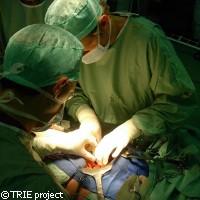Transplant experts set out plans for future research
Recent years have seen huge advances in transplant medicine, but more research is urgently needed to improve the long-term prospects of transplant patients, according to researchers, doctors and patient representatives at a meeting in Brussels, Belgium organised by the EU-funded TRIE ('Transplantation research integration in Europe') project. Approximately 250,000 people in Europe are living with a functional organ transplant and every year some 15,000 kidney transplants, 5,000 liver transplants, 2,000 heart transplants and 1,000 lung transplants as well as thousands of bone-marrow transplants are carried out. For these patients, the transplant is literally a life saver, and the short-term prospects of most transplant patients are very good. However, in the longer term many of these patients will face serious health issues. A significant number of problems are caused by the cocktail of immunosuppressive drugs that transplant patients take to prevent their immune system from attacking the donor organ. Side effects of these drugs include cancers, infections, kidney problems, cardiovascular disease, diabetes and bone diseases, to name just a few. Despite the many immunosuppressive drugs they take, the rejection of donor organs remains a serious problem for transplant patients; around half of all kidney transplants fail within 15 years because of chronic rejection. Patients who have received a bone-marrow transplant may suffer from graft-versus-host disease, in which immune cells from the donated bone marrow or cord blood attack the recipient's body. The EU is funding a number of projects designed to address these problems. For example, the RISET ('Reprogramming the Immune System for the Establishment of Tolerance') project is investigating tests and techniques that could reduce the number of immunosuppressant drugs the transplant patients need to take. The project partners have already identified a molecular signature that is being turned into a test to determine which patients could safely reduce their intake of immunosuppressive drugs. In the case of liver transplants, as many as 20% of transplant patients could survive without many of these immunosuppressive drugs, the researchers say. The RISET team has also found that the immune system's tolerance of the donated organ can be improved if so-called 'tolerogenic' cells are transplanted along with the organ. These tolerogenic cells effectively educate the host's immune system to accept the new organ, thereby possibly reducing the need for immunosuppressive medicines. Elsewhere, the Allostem project is working on stem-cell transplantation technologies for the treatment of leukaemia and related diseases. Among other things, the team has developed novel technologies to generate cell lines against both tumours and infectious agents as well as methods to increase the short- and long-term engraftment potential of stem cells. A major problem in transplant medicine is the shortage of donor organs: up to 30% of candidates for heart and liver transplants die while on the waiting list. The XENOME ('Engineering of the porcine genome for xenotransplantation in primates: a step towards clinical application') project is developing genetically engineered pigs whose cells can be safely transplanted into non-human primates. They have already successfully transplanted pancreatic cells into diabetic primates; the transplants effectively treated the primates' diabetes and the animals survived without the use of immunosuppressive drugs. The TRIE project, which organised the meeting, brings together academia, clinicians, industry representatives and patient groups with the aim of developing a coherent strategy for integrating transplantation research in Europe. The partners have already identified three major priorities, namely the identification of biomarkers which could help doctors to define risk profiles for patients and tailor pre- and post-transplant treatments; the development of novel cell-based therapies; and the establishment of an innovative training programme for scientists and healthcare staff involved in research on cell and organ transplantation. Currently, the strategy is open for consultation by transplant patients, people waiting for transplants and patient organisations. Early indications are that patients agree with the priorities identified by the project partners and are keen to be involved in future research.



